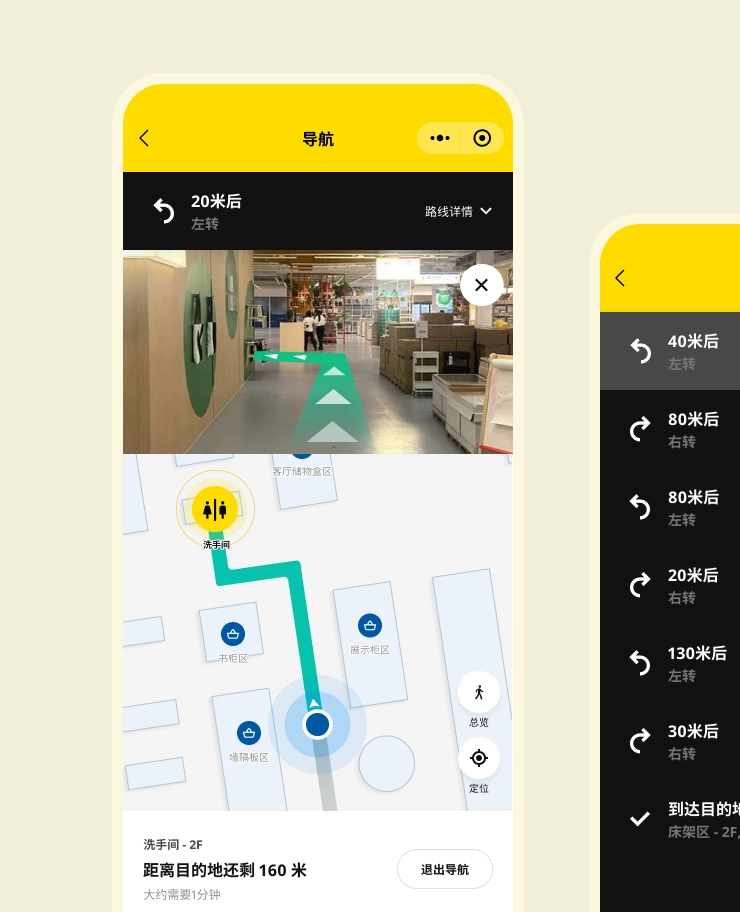From Maps to Apps: Key Location Service Packages for Chinese App Development
May 8th, 2024 · Written by Samuel Jesse

Contents
In today's digital world, location-based services (LBS) are vital to enhancing mobile app functionalities for services like navigation, ride-hailing, social networking, and fitness tracking.
Developing location-based services (LBS) for apps in China requires a different approach compared to much of the world due to restrictions on Google services, including Google Maps. This has led to several Chinese location service providers offering comprehensive mapping, navigation, and place data suited to the unique landscape of Chinese regulations and user preferences.
In this post, we will look into GPS and location service providers in China and explore the various options available to developers seeking to integrate location-based features into their mobile applications. We'll examine the key players in the Chinese market, including industry giants like Baidu, Tencent, and Amap (Alibaba), dissecting their offerings, integration processes, and real-world use cases.
Building a location-based mobile app in China?
With our deep expertise in developing location-based service apps, we deliver GPS tracking solutions tailored specifically for the Chinese market.
Key Location Service Providers in China
Amap (高德地图)

Overview and Features
AMap, also known as Gaode Maps, is provided by AutoNavi, a subsidiary of Alibaba Group. It's highly popular due to its accurate mapping and comprehensive location-related data services. The Amap SDK offers comprehensive features for mobile app developers to integrate location capabilities into their applications.
Its popularity among the programming community and extensive developer resources make it a go-to choice for many local app development projects requiring location services.
Key features of the Amap SDK include:
-
Support for GPS, Wi-Fi, and cellular network positioning
-
Real-time location tracking and updates
-
Reverse geocoding and address resolution
-
Geofencing and proximity alerts
-
Traffic information
-
Indoor positioning and navigation
-
Route planning and turn-by-turn navigation
-
Integration with Alibaba's e-commerce ecosystem for optimized logistics and delivery services
Integration Process and Documentation
Amap provides extensive documentation, sample code, and developer guides to facilitate integration. The Amap SDK is available for both Android and iOS platforms, ensuring compatibility with a wide range of mobile applications.
To get started, developers must register for an Amap Developer account and obtain the necessary API keys and credentials. Amap offers step-by-step tutorials, code samples, and comprehensive documentation to ensure a smooth integration experience.
Developers can also leverage Amap's extensive range of APIs, including:
-
Geographic/Reverse Geocoding API
-
Path Planning API
-
Search API
-
Input Hint API
-
Administrative Region Query API
-
Static Map API
-
IP Location API
-
Coordinate Conversion API
-
Weather Query API
-
Trajectory Correction API
-
Cloud Map Service API
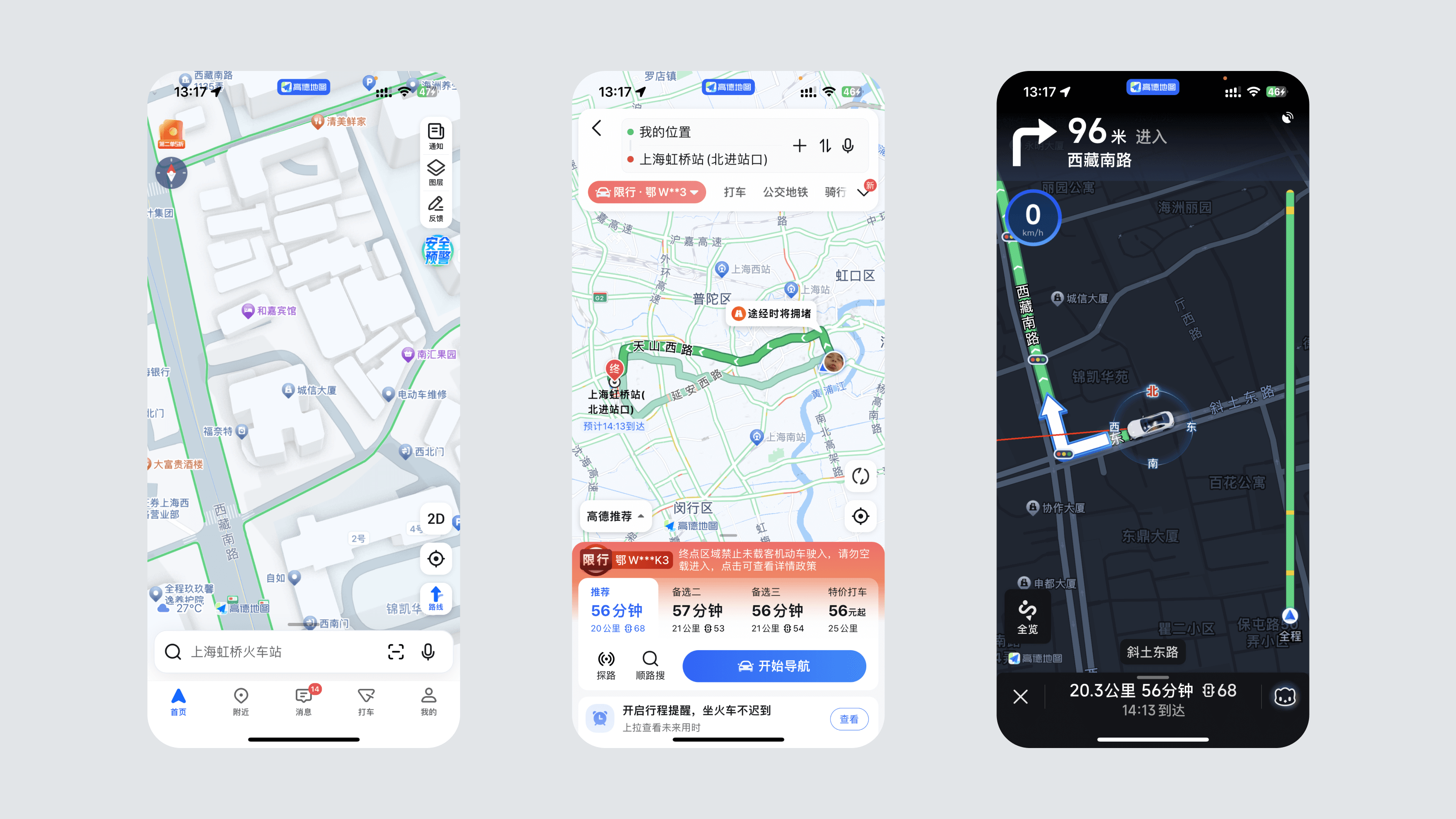
Gaode map(高德地图)app interface
The Amap location packages have been widely adopted by mobile applications across various industries, including:
1. Navigation and Transportation Apps
Apps like Gaode Maps (Amap's flagship navigation app) and DiDi Chuxing (China's largest ride-hailing platform) utilize Amap's location services for real-time tracking, route optimization, and turn-by-turn navigation.
2. E-commerce and Delivery Services
Companies in the e-commerce and delivery sector, including Alibaba's own logistics and delivery services, rely on Amap's location features for accurate delivery tracking, optimized route planning, and efficient last-mile logistics. Ele.me (an Alibaba-owned food delivery service) uses AMap for routing and delivery tracking.
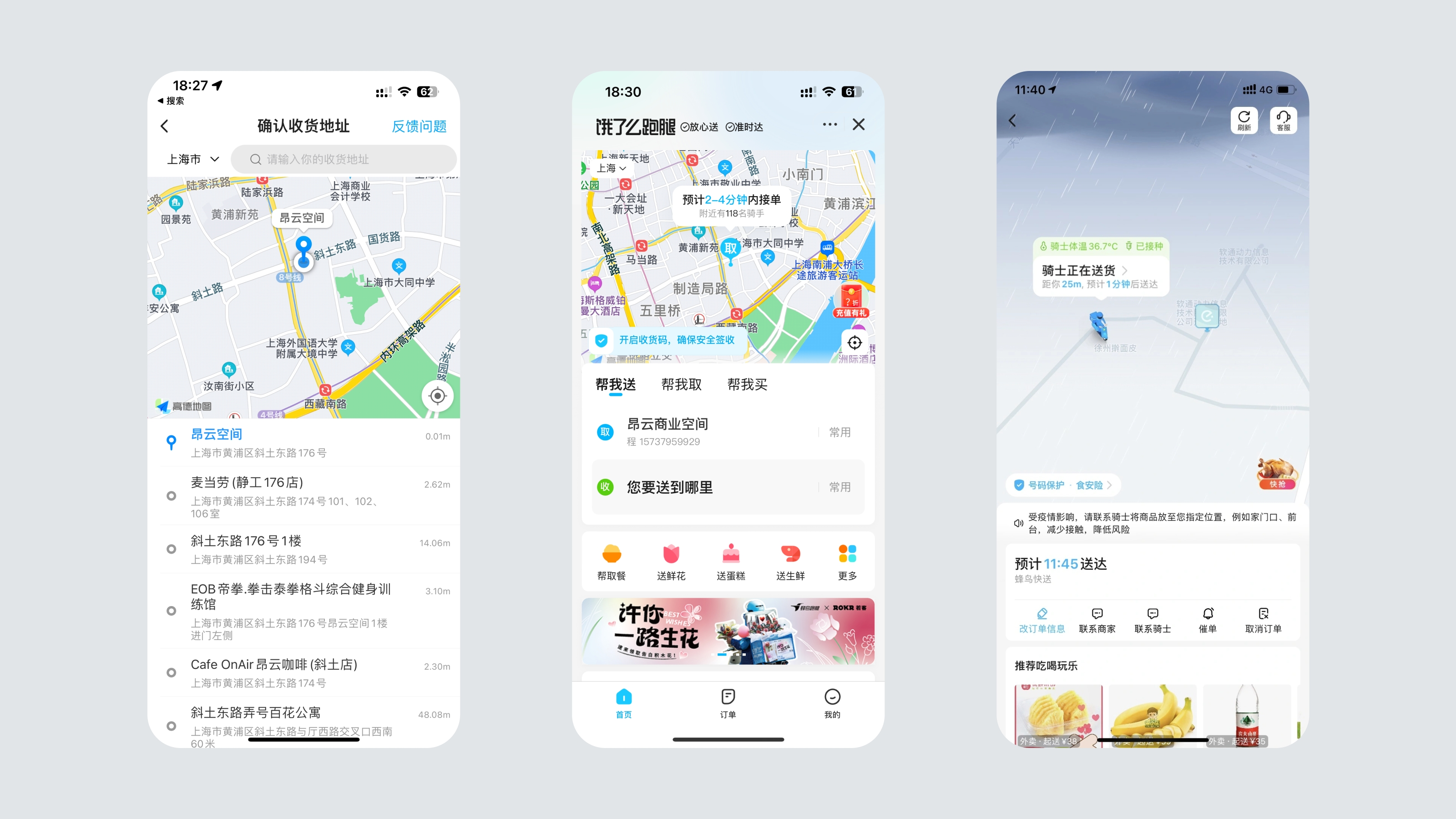
EleMe (饿了么) meal and grocery delivery app interface
3. Location-Based Marketing and Advertising
Businesses leverage Amap's geofencing and proximity alerts to deliver targeted location-based marketing campaigns and personalized offers to users based on their locations.
4. Integrated Solutions
Amap offers a range of integrated solutions, such as the WeChat applet plugin, which enables developers to incorporate Amap's services within WeChat mini-programs, and the HarmonyOS Map SDK, which allows seamless integration with Huawei's operating system.
6. Innovative Consumer Experiences
Amap's location services have been instrumental in powering innovative consumer experiences, such as the award-winning Rolling Beast app developed by Digital Creative Asia. This groundbreaking 3D ski tracking app for iOS and Android allows skiers and snowboarders in China to track their runs using GPS and replay and share interactive 3D experiences in digital twins of ski resorts.
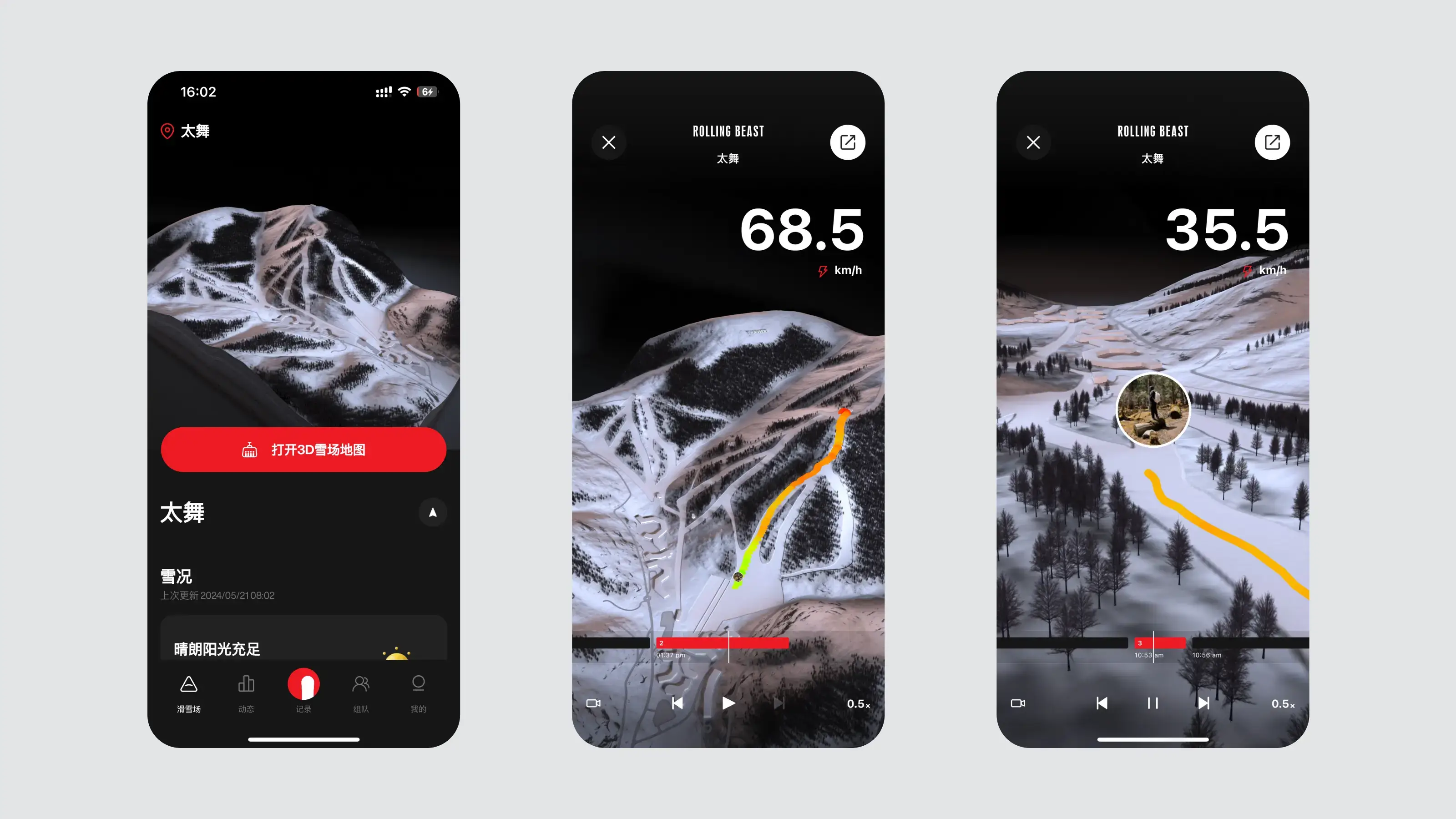
Rolling Beast ski tracking app features and interface
By leveraging Amap's robust location-tracking capabilities and pairing them with 3D visualization and machine learning algorithms, Rolling Beast transformed the ski-tracking experience. It enables users to explore 3D resort trails, find friends at resorts, unlock achievements, and share 3D replays on WeChat using WebGL technology.
With its comprehensive feature set, robust positioning technology, extensive API offerings, and deep integration with Alibaba's ecosystem, the Amap SDK provides a powerful solution for developers seeking to incorporate location-based services into their mobile apps for the Chinese market.
Baidu Location Services (百度地图)

Overview and Features
Baidu Maps is one of the leading location service providers in China. It offers detailed map data, navigation, and location-based search capabilities. It is integrated with Baidu's search engine and offers robust APIs for developers.
Key features of the Baidu Location SDK include:
-
Support for GPS, Wi-Fi, and cellular network positioning
-
Real-time location tracking and updates
-
Reverse geocoding and address resolution
-
Geofencing and proximity alerts
-
Offline maps and location caching
-
Indoor positioning and navigation
-
Traffic information
-
Overseas positioning in over 200 countries and regions, supporting 52 languages
Integration Process and Documentation
Baidu offers detailed documentation and sample code to simplify the integration process for developers. The Baidu Location SDK is available for both Android and iOS platforms, making it accessible to a wide range of mobile app developers.
To get started, developers must register for a Baidu Developer account and obtain the necessary API keys and credentials. Baidu provides step-by-step guides, tutorials, and code samples to streamline the integration process and ensure a smooth developer experience.
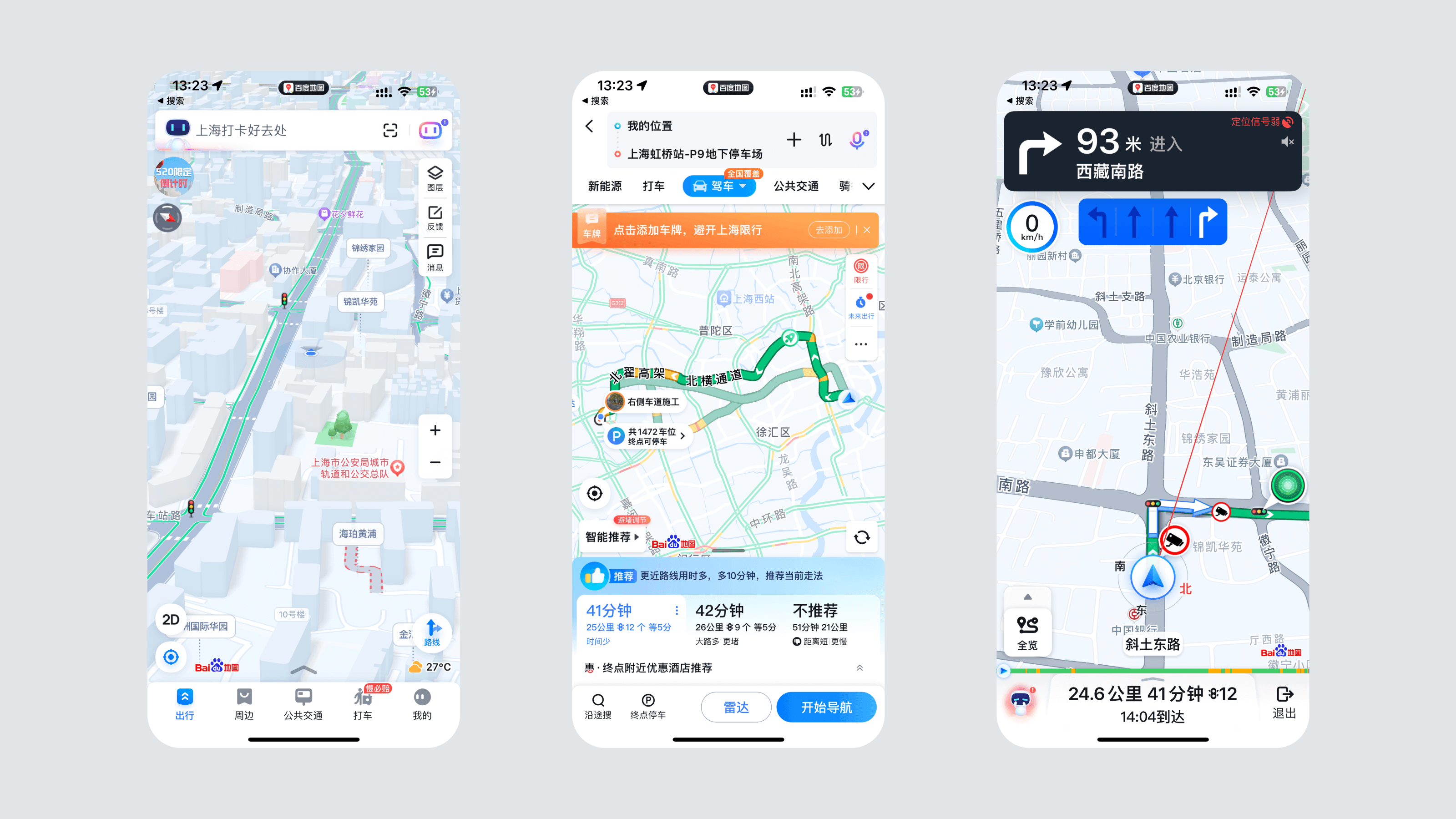
Baidu map(百度地图)app interface
The Baidu Location SDK has been utilized in a variety of mobile applications across different industries, including:
1. Navigation and Ride-Sharing Apps
Apps like Didi Chuxing (China's largest ride-hailing platform) leverage Baidu's location services to track drivers and passengers in real-time, optimize routes, and calculate estimated time of arrival.
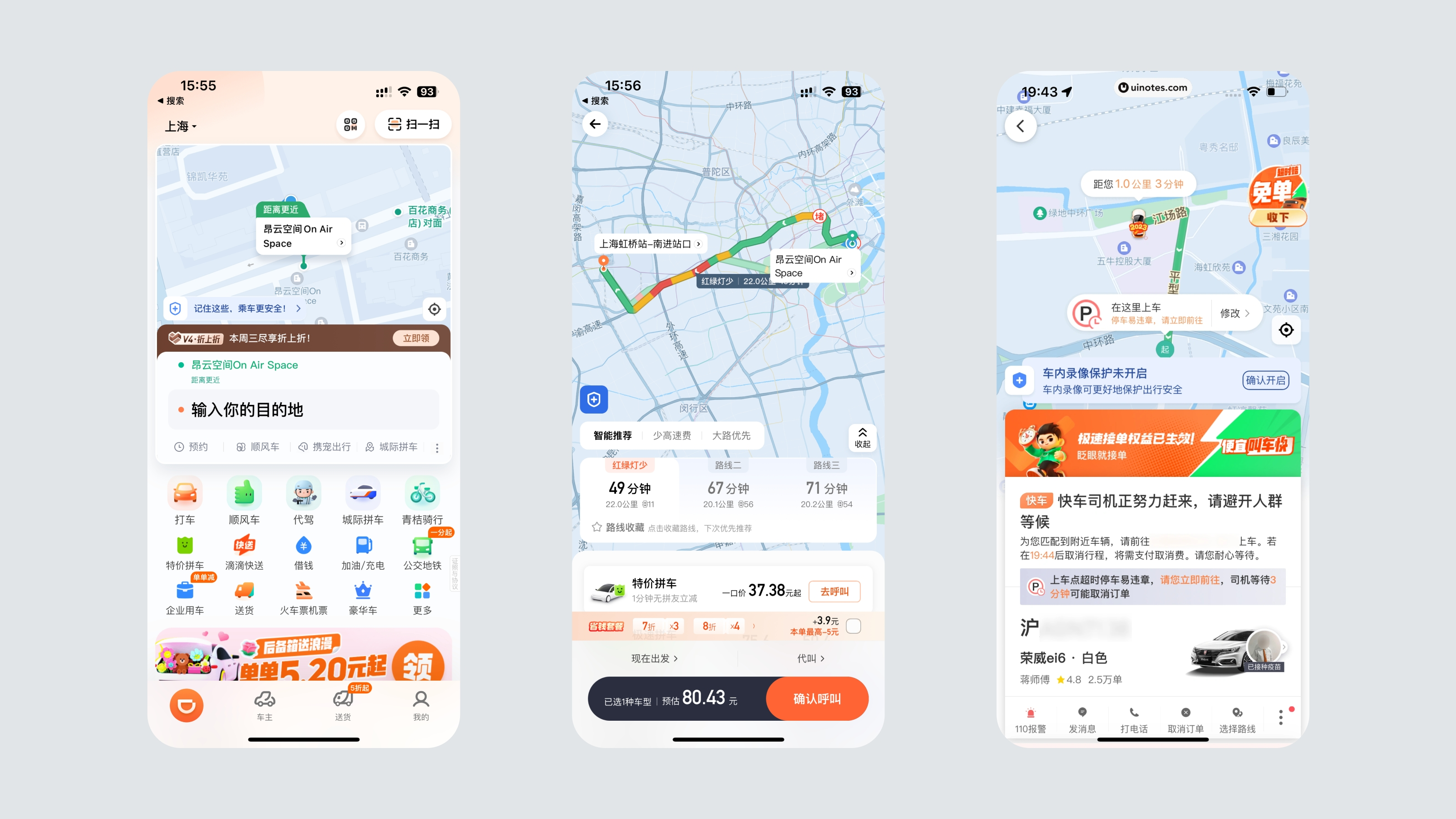
DiDi ChuXing (滴滴出行)ride hailing app interface
2. Location-Based Social Networks
Social apps like WeChat and Momo use Baidu's location features to enable location-based friend discovery, check-ins, and location-sharing capabilities.
3. Logistics and Delivery Services
Companies in the logistics and delivery sector rely on Baidu's location services for real-time vehicle tracking, optimized route planning, and efficient last-mile delivery. Meituan-Dianping, a popular retail and food delivery app, integrates Baidu Maps for location services.

Meituan (美团)retail and food delivery app interface
4. Asset Tracking and Fleet Management
Businesses can leverage Baidu's geofencing and location-tracking capabilities to monitor valuable assets, vehicles, and personnel, ensuring efficient operations and enhanced security.
5. Travel Services
Travel apps can use Baidu's precise positioning and location description to clarify pick-up and drop-off points for ride services and help drivers locate users more accurately.
6. Audio and Video Entertainment
Leveraging Baidu's location services in audio and video entertainment apps can enable location-based content recommendation, user discovery, and precise marketing.
Tencent Location Services

Tencent LBS Developer Platform
Overview and Features
The tech conglomerate behind WeChat and other popular apps offers a comprehensive location-based services platform through its Tencent Location SDK. This SDK provides developers robust tools for integrating location features into their mobile applications. With its integration into Tencent’s vast ecosystem, including WeChat, Tencent Maps is ideal for social and gaming apps.
Key features of the Tencent Location SDK include:
-
Support for GPS, Wi-Fi, and cellular network positioning
-
Real-time location tracking and updates
-
Reverse geocoding and address resolution
-
Geofencing and location-based alerts
-
Indoor positioning and navigation
-
Traffic information
-
Activity recognition (walking, running, driving, etc.)
-
3D map rendering with rotation, 3D building blocks, and data visualization (heat maps, road conditions, etc.)
-
Personalized map styles and customization options
Tencent Location Services boasts advanced mapping capabilities, including support for flat maps, road networks, 3D building blocks, satellite imagery, and real-time traffic conditions. The 3D Map SDK offers a cool effect with rotation, 3D building blocks, and more practical interfaces like heat maps and road conditions. It suits scenarios relying heavily on maps, such as navigation, ride-sharing, and designated driver apps.
Integration Process and Documentation:
Tencent provides detailed documentation, sample code, and developer guides to streamline the integration process. The Tencent Location SDK is available for both Android and iOS platforms, catering to a wide range of mobile app developers.
To get started, developers must register for a Tencent Cloud account and obtain the necessary API keys and credentials. Tencent offers step-by-step tutorials, code samples, and comprehensive documentation to ensure a smooth integration experience.
Developers can also create and configure personalized map styles through the Tencent Personalized Map official website, with options to customize the display effects of various map elements, such as green spaces, water systems, road networks, and POIs.
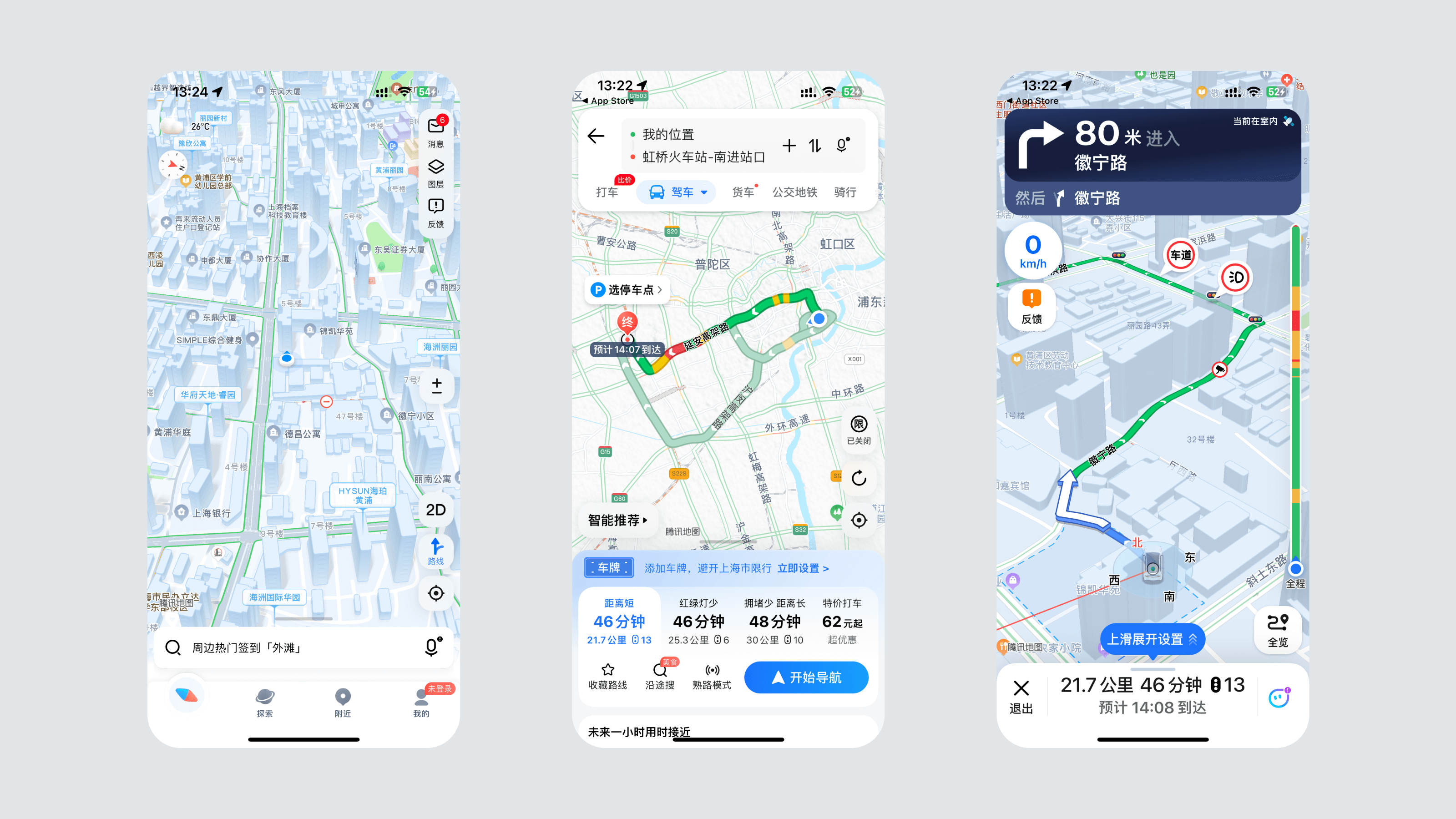
Tencent Map (腾讯地图)app interface
1. Location-based games and AR Experiences
Developers leverage Tencent's location services to create immersive augmented reality (AR) experiences and location-based games, enabling features like virtual treasure hunts and location-based challenges.
2. Fitness and Wellness Apps
Apps like Keep (Tencent's fitness platform) use the Location SDK to accurately track outdoor activities such as running, cycling, and hiking, providing users with detailed metrics and activity summaries.
3. Ride-Sharing and Mobility Services:
Companies in the ride-sharing and mobility sectors rely on Tencent's location services for real-time vehicle tracking, optimized route planning, and accurate ETAs.
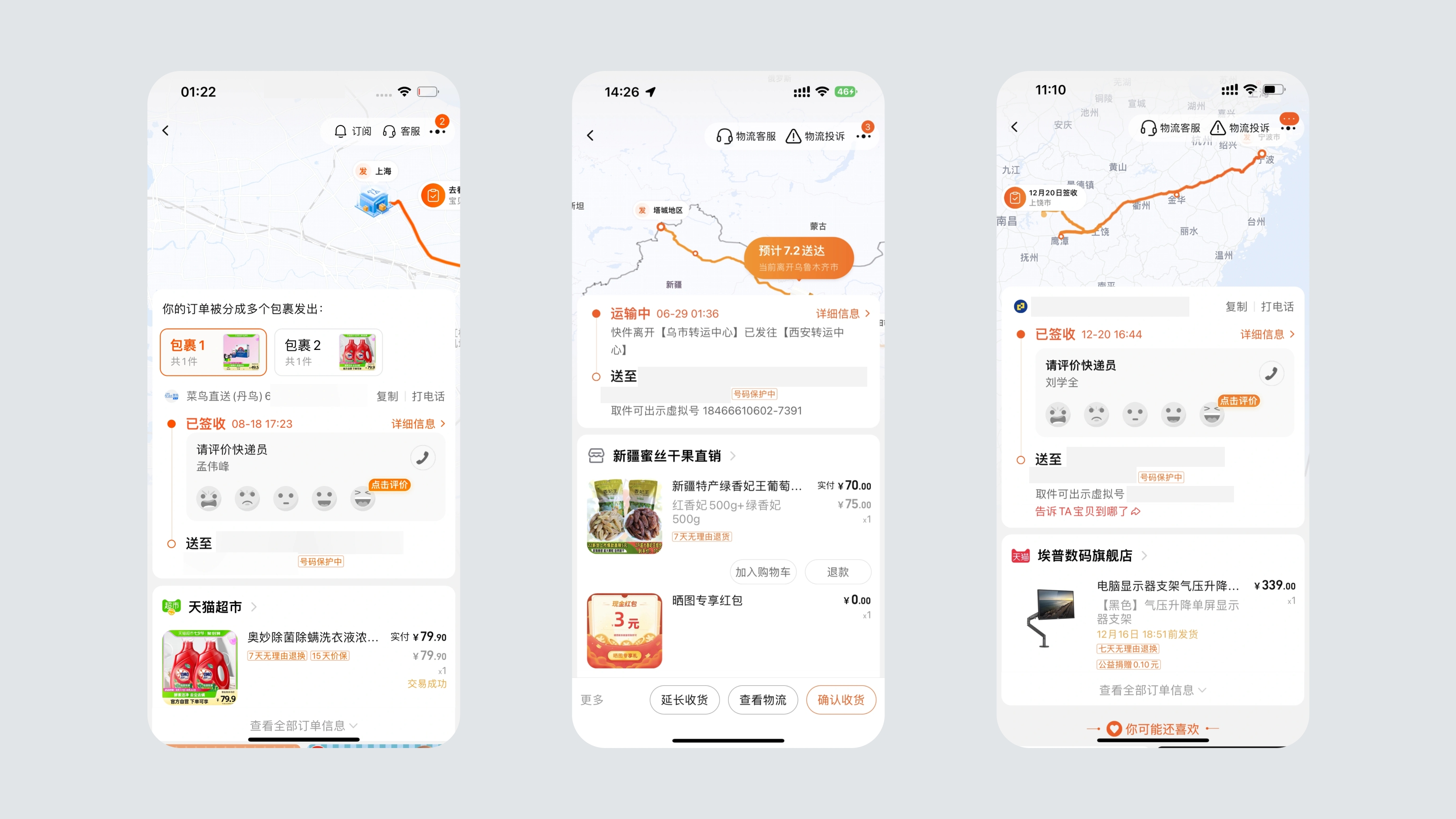
Taobao (淘宝)e-commerce app features delivery tracking progress
4. Asset Tracking and Fleet Management:
Businesses can use Tencent's location features to monitor valuable assets, vehicles, and personnel, ensuring efficient operations and enhanced security.
5. Navigation and Mapping Applications:
With its advanced mapping capabilities, including 3D rendering, data visualization, and personalized map styles, the Tencent Location SDK is well-suited for building navigation and mapping applications tailored to specific industry needs.
6. Social Networks:
WeChat uses Tencent Maps for location-based services within the app. QQ, another Tencent social media platform, integrates map and navigation features.
Other Notable Location Service Providers
While Baidu, Tencent, and Amap are among China's most prominent GPS/location service providers, several other players in the market offer similar capabilities. These providers may appeal to developers looking to explore alternative solutions or cater to specific use cases or ecosystems.
Huawei Location Services
Huawei, the leading Chinese tech giant, provides its own location services through the Huawei Location SDK. Key features of this SDK include GPS, Wi-Fi, cellular network positioning, activity recognition (walking, running, cycling), geofencing, and indoor positioning. The Huawei Location SDK is particularly well-suited for applications targeting Huawei's vast ecosystem of devices and services, offering seamless integration and optimization.
Here WeGo (和图地图)
Initially a Nokia service, Here WeGo has been adapted for the Chinese market under the name 和图地图 (Hetu Maps). It offers detailed global and local map data, making it a compelling choice for international apps operating in China that need consistent mapping data both inside and outside the country.
Key features include global and local map data, navigation and public transit routing, location search, place information, and real-time traffic conditions. Here WeGo is well-suited for international apps, automotive navigation systems, and urban planning/smart city applications.
Mapbox China
Due to China's unique mapping requirements, Mapbox China offers a specific service. This version complies with Chinese regulations while providing Mapbox's customizable mapping tools. Key offerings include customizable maps with local styling, location search and geocoding, navigation and route optimization, and data visualization for geographic datasets.
Mapbox China is well-suited for apps requiring a high degree of map customization, data analytics platforms needing spatial visualization, and urban mobility solutions with a focus on aesthetic map presentations.
NavInfo Location Services
NavInfo(https://www.navinfo.eu/about-us/) is among China's leading digital mapping, navigation, and location-based service providers. Their location SDK offers a range of features, including GPS, Wi-Fi, cellular network positioning, reverse geocoding, route planning, and real-time traffic information. NavInfo's strength lies in its comprehensive and up-to-date mapping data, making it a viable choice for navigation and location-based applications prioritizing map accuracy and completeness.
UniStrong Location Services
UniStrong (http://en.unistrong.com/) is a Chinese company specializing in location-based services and spatial data solutions. Their location SDK supports GPS, Wi-Fi, cellular network positioning, and features like geofencing, indoor positioning, and location analytics. UniStrong's offerings are particularly well-suited for enterprise applications, asset tracking, and fleet management solutions, where robust location data and analytics capabilities are essential.
These providers offer core features similar to those of major players, such as GPS, Wi-Fi, cellular network positioning, reverse geocoding, and location-based services. However, their market share and adoption may vary depending on the industry, use case, or target ecosystem. Developers should carefully evaluate each provider's offerings, strengths, and limitations to determine the best fit for their application requirements and target audience.
Overview of Major GPS & Location Service Providers in China (Updated for Early 2024)
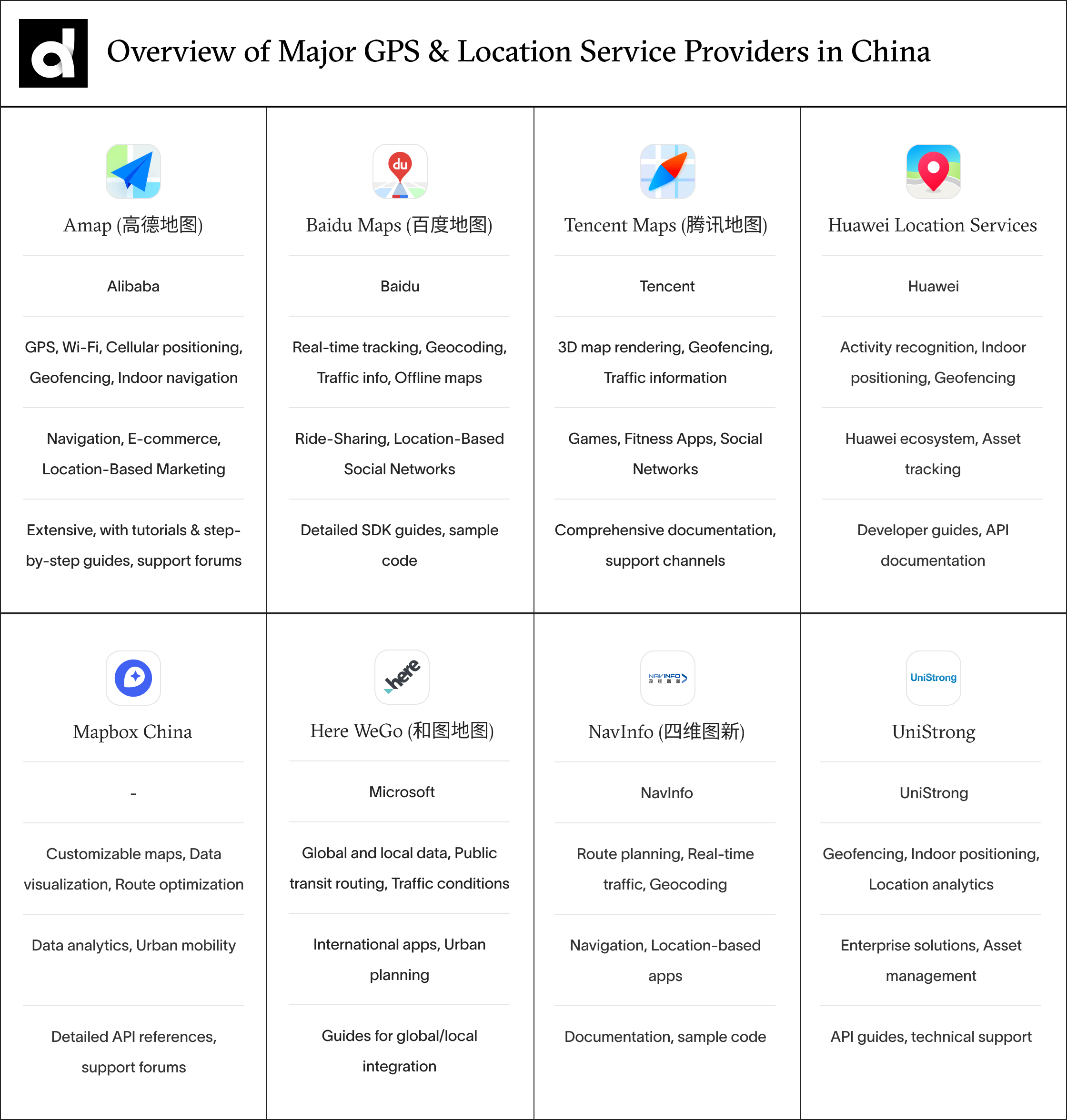
Choosing the Right Location Service Provider for Your App in China
Selecting the appropriate GPS/location service provider is a critical decision that can significantly impact the success of your mobile app in the Chinese market. With several options available, evaluating each provider is essential, considering your app's specific requirements, target audience, and overall development goals.
Key Factors to Consider:
1. Accuracy and Precision:
-
Understand your app's positioning accuracy needs across different scenarios (urban, rural, indoor, and outdoor).
-
Evaluate providers' positioning techniques (GPS, Wi-Fi, cellular network) and hybrid algorithms for optimal accuracy.
-
Major players like Baidu, Tencent, and Amap offer highly accurate positioning solutions tailored to the Chinese market.
2. Performance and Battery Optimization:
-
Assess providers' strategies for intelligent location tracking, data caching, and power-saving modes.
-
Choose a provider that balances accuracy, performance, and battery efficiency for your use case.
3. Integration and Interoperability:
-
Consider seamless integration with popular mapping SDKs, cloud platforms, analytics tools, and third-party services specific to your app's requirements.
-
Providers like Tencent offer advanced mapping capabilities and integration with their ecosystem (e.g., WeChat).
4. Developer Resources and Support:
-
Evaluate the documentation quality, sample code, developer communities, and technical support channels.
-
Providers with strong local developer communities, like Amap, can offer valuable resources and support.
5. Pricing and Licensing Models:
-
Assess pricing plans, free tiers, usage-based pricing, and upfront licensing fees based on your app's projected usage and budget.
-
Consider additional costs for premium features like indoor positioning, activity recognition, or real-time traffic data.
6. Local Market Presence and Adoption:
-
Prioritize providers with a strong presence and adoption in the Chinese market, as they will likely offer better localization, performance, and regulatory compliance.
-
Baidu, Tencent, and Amap are widely adopted and tailored for the Chinese market dynamics.
7. Use Case and Industry-Specific Considerations:
-
Evaluate providers' strengths and specialized offerings for your app's specific use case or industry.
-
For example, Amap's integration with Alibaba's e-commerce ecosystem can benefit delivery and logistics apps.
8. Regulatory Compliance and Data Privacy:
-
Ensure the provider adheres to China's data privacy laws and regulations, such as Cybersecurity and Personal Information Protection Law (PIPL).
-
Major providers prioritize compliance and offer resources to help developers navigate legal requirements.
Tips and Best Practices for Location-Based Apps in China
Integrating location services into your mobile app can unlock many opportunities in the vast Chinese market. However, to deliver an exceptional user experience, optimizing your implementation, anticipating potential challenges, and staying ahead of industry trends is crucial.
Here are some essential tips and best practices to consider:
1. Performance Optimization and Battery Efficiency:
-
Implement intelligent location tracking techniques that adapt to user activity, speed, and signal conditions, adjusting frequency and accuracy accordingly.
-
Leverage data caching, offline support, and power-saving modes to reduce network requests, improve performance, and extend battery life.
-
Major providers like Baidu, Tencent, and Amap offer advanced battery optimization strategies tailored to the Chinese market.
2. Handling Edge Cases:
-
Implement fallback mechanisms that seamlessly switch between GPS, Wi-Fi, and cellular network positioning to ensure reliable location tracking in urban canyons, indoor environments, or areas with poor GPS coverage.
-
Integrate indoor positioning solutions, which are increasingly important in China's rapidly urbanizing landscape.
-
Provide offline functionality and background syncing for areas with limited connectivity.
3. Comprehensive Testing and Monitoring:
-
Thoroughly test your location-based features across various devices, operating systems, and real-world scenarios specific to the Chinese market.
-
Leverage providers' monitoring and analytics tools to track performance, accuracy, and user engagement with location-based features.
-
Implement user feedback and reporting mechanisms to address issues and maintain user trust promptly.
4. Regulatory Compliance and Data Privacy:
-
Ensure strict adherence to China's data privacy laws and regulations, such as Cybersecurity and Personal Information Protection Law (PIPL).
-
Obtain explicit user consent, implement robust data protection measures, and maintain transparency regarding location data collection and usage.
-
Major providers prioritize compliance and offer resources to help developers navigate legal requirements.
5. Localization and Cultural Considerations:
-
Tailor your location-based features and user experience to the cultural preferences and expectations of the Chinese market.
-
Leverage location-based services that integrate with popular local platforms and ecosystems, such as WeChat (for Tencent) or Alibaba's e-commerce ecosystem (for Amap).
-
Ensure seamless language support, address formatting, and customized map styles to provide a truly localized experience.
6. Future-Proofing and Innovation:
-
Stay updated on emerging trends and technologies, such as 5G, sensor fusion, privacy-enhancing technologies, and decentralized location services.
-
Explore innovative use cases and experiences leveraging location data, such as augmented reality (AR), gamification, or personalized recommendations.
-
Partner with experienced agencies like Digital Creative Asia, with a proven track record of delivering cutting-edge location-based solutions tailored to the Chinese market.
By following these tips and best practices, you can ensure seamless integration of location services, optimize performance and user experience, maintain regulatory compliance, and stay ahead of the curve in China's rapidly evolving mobile landscape.
Developing a location-based mobile app that leverages GPS and other location services in China is a complex undertaking that requires a deep understanding of the technology, regulatory landscape, and local market dynamics. While this guide has provided a comprehensive overview of the major location service providers, technical considerations, and best practices, the successful execution of such a project often hinges on partnering with the right development agency.
Digital Creative Asia, a leading digital product development agency, stands out as a trusted partner for companies looking to build innovative location-based apps for the Chinese market. With a proven track record of delivering cutting-edge solutions like the award-winning Rolling Beast app, our expertise in this domain is undeniable.
If you're ready to start your location-based app journey in China, we invite you to contact us and explore how our team can bring your vision to life, navigate the complexities of the local market, and deliver an exceptional user experience.
Have a project in mind?
Join our newsletter!
Get valuable insights on the latest digital trends, strategies, and developments in China and globally delivered straight to your inbox.
